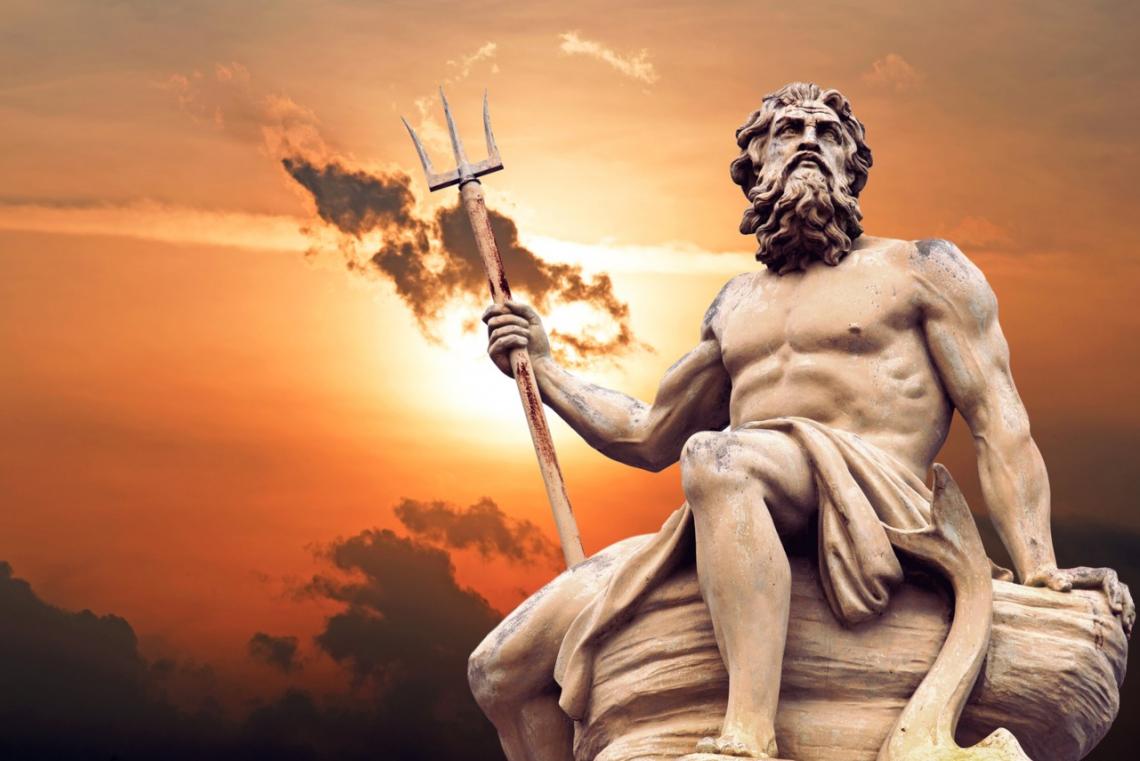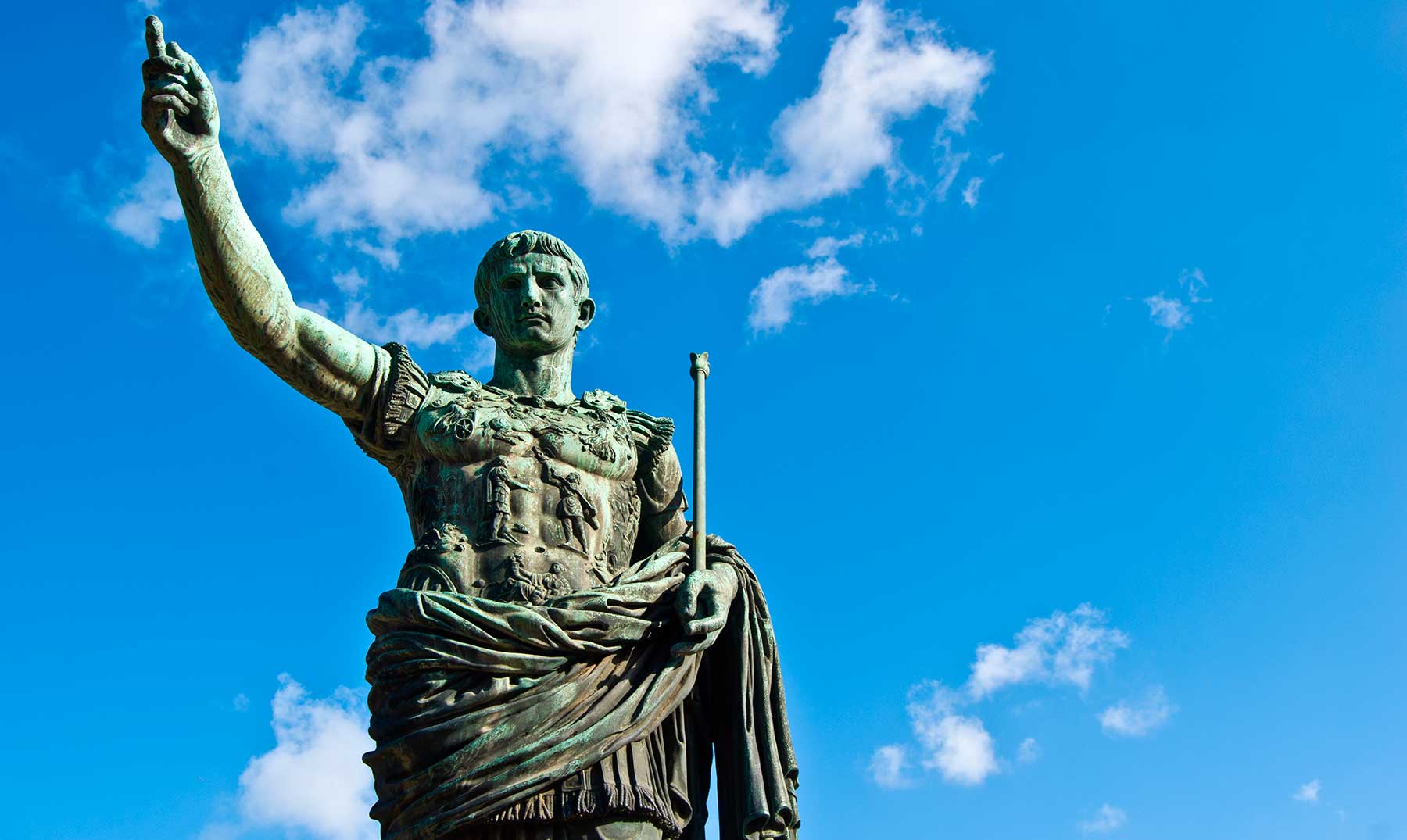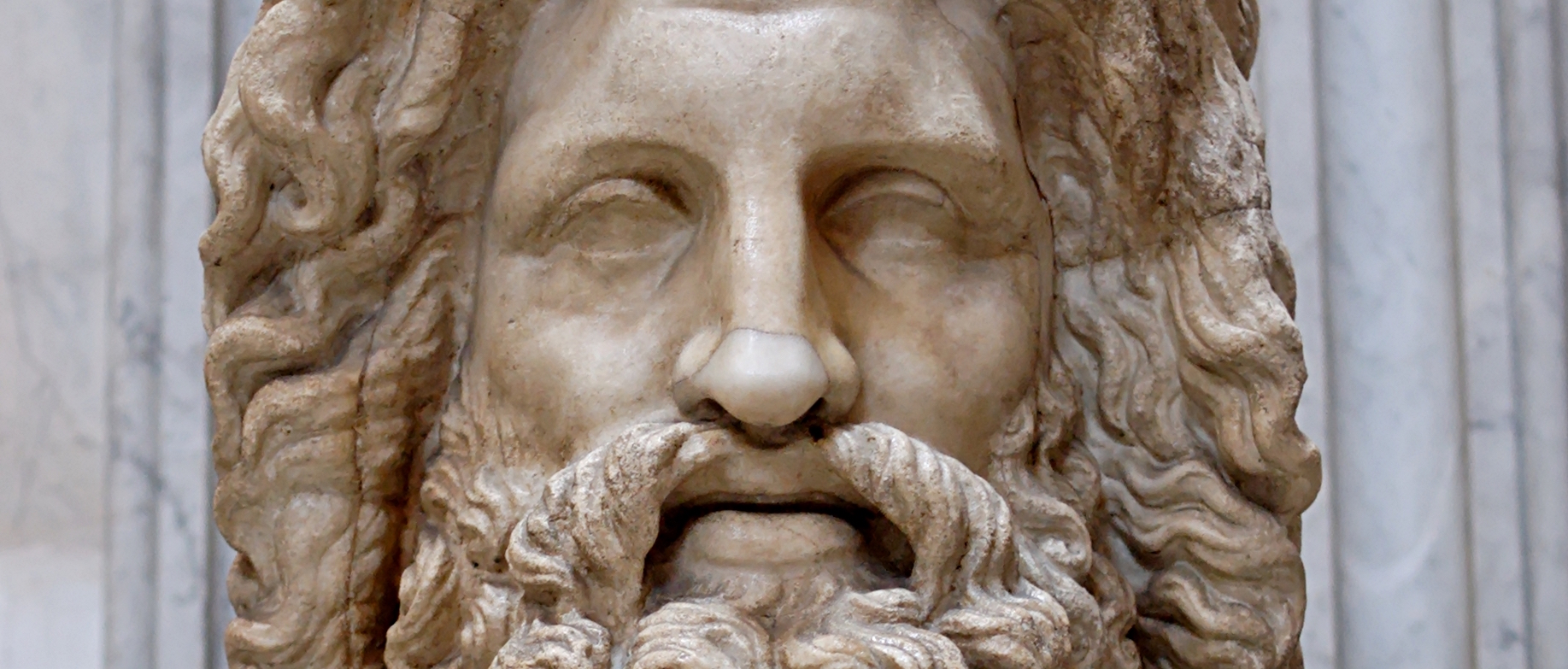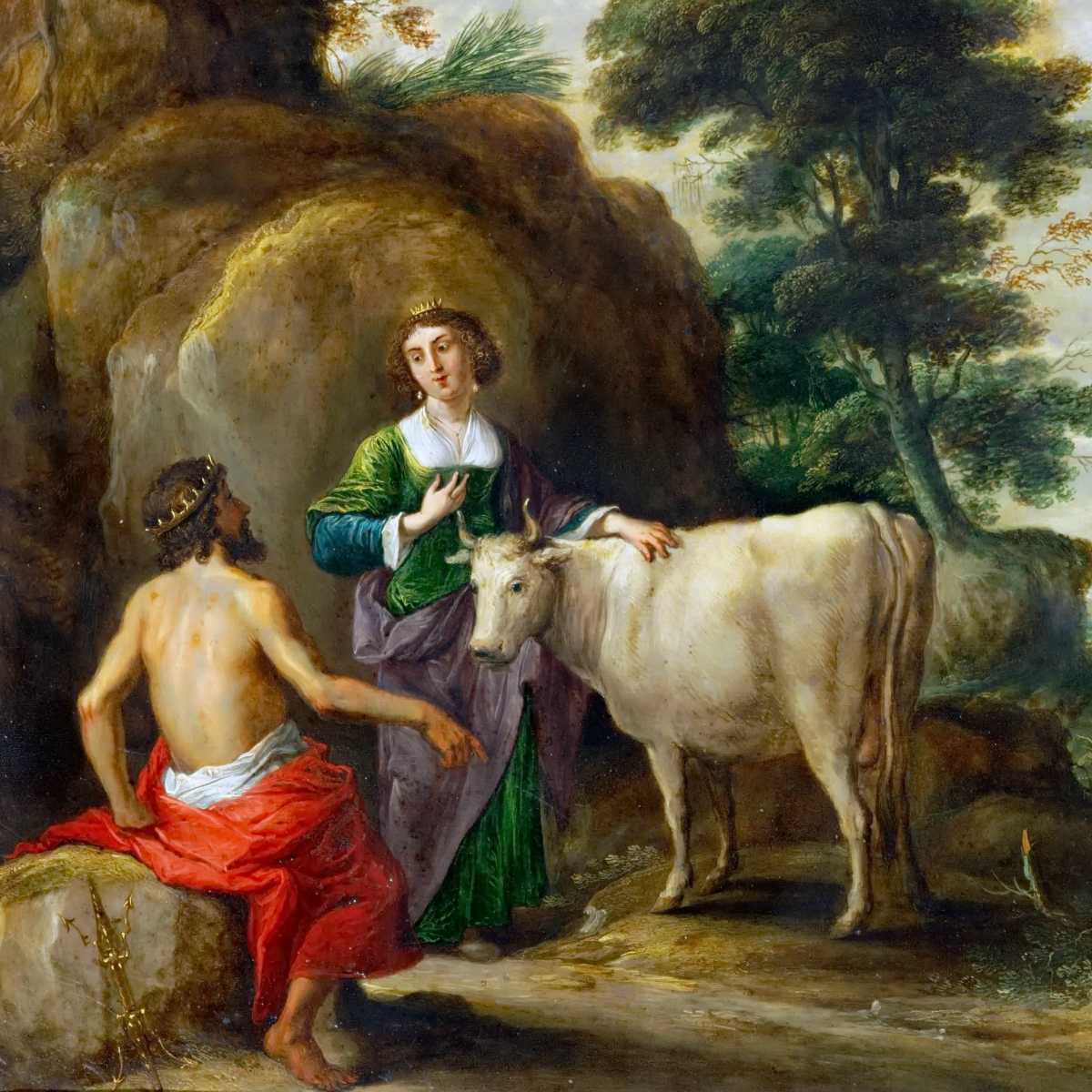Once Greece was invaded and looted by the Romans, not only were the cities dominated but they also appropriated Greek culture, making a species a mimesis (or copy) of their deities, one of them was that of Zeus which in Rome would henceforth be known as the God Jupiter.
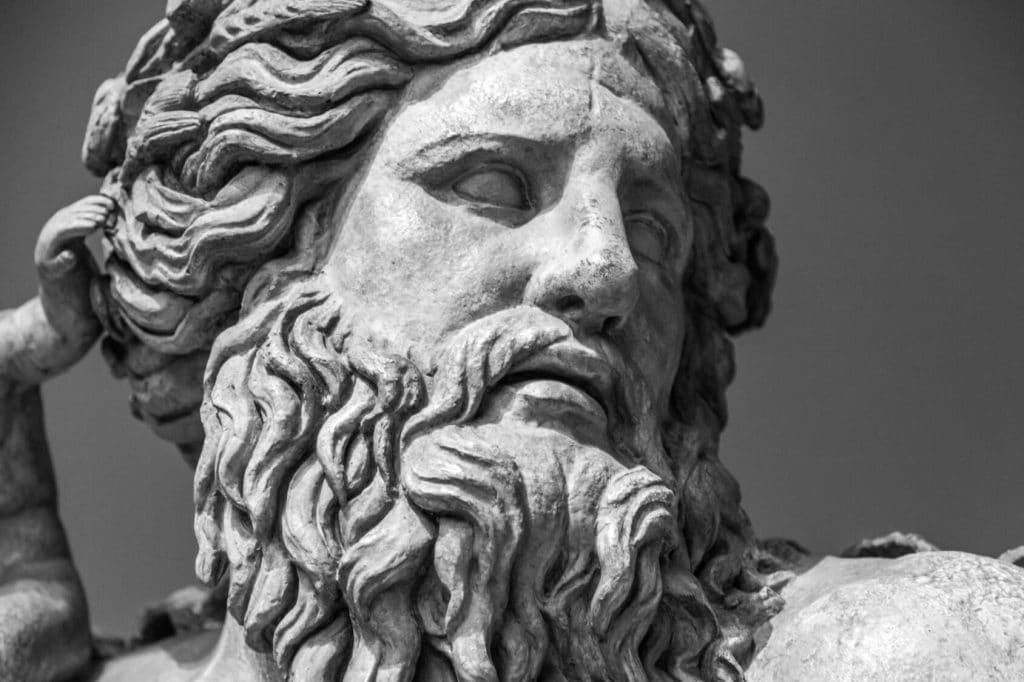
Let's meet the god Jupiter
Definitely the Roman culture is from its beginnings, around the years 700 a. C., an example of expansion and courage for how warlike she was, especially around the years of the coming of Christ and even later when the religious ideas of practicing Christianity prevailed, before her fall in 400 AD. C., covering with its ideology the entire empire and consequently a large part of the world.
The roman myths that were built and rebuilt over the centuries lead us to characters like the one who will take our attention on this occasion: the god jupiter, the sovereign and supreme of thunder, lightning and storms, who is also attributed the task of guiding men.
We know that due to cultural exchange all the Roman gods have their origin or are equivalent to a Greek god; Jupiter es Zeus who in Greek mythology is the son of Chronos, the god of time, and of Rhea, mother earth, who in the Roman world are Saturn y Oops.
Rome was founded in the center of what is now Italy surrounded by great monarchies, from its founding myths we start from a quarrel that refers to the moment in which the twins Remo y Romulus They founded Rome after Romulus will kill Remo . Originally these first settlers believed that the spirits of their ancestors were watching them and that is why they imprinted mythical characteristics on those mysterious forces, eventually turning them into their gods.
The first three gods recognized by the Romans were Mars, God of War; Quirinus, a god-like personification in honor of Romulus; and the supreme god Jupiter. He would advance in this triad, coming to hold the name of Jupiter Optimus Maximus until there came a point where the three main gods of Rome were himself. On the other hand, his wife was June, o Ivy in Greece, queen of the gods and her daughter Minerva, goddess of wisdom.
The God Jupiter He was the personification of light, he was the one who gave victory and a great protector during defeat, he was surnamed as Jupiter the emperor, Jupiter the supreme general, the undefeated, the winner, among other bombastic adjectives that underlined its character of magnificence.
In times of war it protected the Roman people and in times of peace it fostered prosperity. Its iconography is recognized as the image of an old man who wears a toga and has a long white beard; he is seated on the supreme throne and has a scepter on which is an eagle perched on top.
Anyone could be struck by lightning Jupiter That is why he was so respected, followed and feared by the men of his town. But the god, despite that power, was never going to launch a thunderbolt without having warned the person very well before the final thrust, thus giving him the opportunity to correct himself, furthermore, he would not do it without the consent of other gods.
In the footprint of the Greek and Roman civilizations, a large amount of important information for the world is preserved, nothing more and nothing less, let us remember that the first three philosophers who come to mind when we think of Philosophy lived in Greece: Socrates, Plato y Aristotle.
Due to the emergence of outstanding characters like these, who by the way in Rome also had their followers, as is the case of Plotinus, it is extremely interesting and important for us to look at the thought of antiquity to see what ideas fueled the fire of thought and creation in this time and one of them is undoubtedly religion.
Origins of the word Jupiter
Linguistic studies reveal that the word Jupiter arises from the Proto-Indo-European composition dyēus-pəter- which has several meanings, but mainly God the father who governs the sky, the day and also the one that shines or is very bright, due to its association with thunder or the sun itself.
of this same dyēus-pəter- come in Sanskrit and Germanic (both ancient languages that gave rise to Hindu and German) their words to describe their supreme gods as Dyaus o Dyaus Pita of the Vedas y tiwaz respectively for each case, even in Greek it is from this linguistic and grammatical root that the name and word come from: Zeus.
Since so many cultures coincide, including the Vedic and Nordic, In associating this idea that the god of the sky is the supreme god, it is not unusual to be inclined to think that precisely this was the most popular original idea in proto-Indo-European culture.
This also shows that the god Jupiter it wasn't just taken from the greek pantheon as it happened with other gods. That is to say, the aborigines, of what would become Europe today, had a great sensitivity and care for what they observed in the sky and how the movements of the sun and the climate interceded in their lives, which in the long run was colored in their languages once established as civilizations.
Another name by which the god is known Jupiter and much more today is for the god Young (o I saw it), so if you get a bibliography there where I talk to you about the god Lovi or Young remember that you are referring to the very Jupiter.
Features
The God Jupiter He is in charge of guiding and maintaining the balance between men, he is the ruler of the sky, he is also in charge of observing that his fellow gods, both brother and sons, and other deities are doing their job well in each specific area of interaction with humans. In addition, one of his tasks is to manage storms, lightning and thunder on Earth.
On a political level it also had great responsibilities both in the pantheon of the gods and in the very heart of human life since it was used as a reference for many political purposes, it was called Jupiter Optimus Maximus which translates into the best, the savior, the great and therefore, it was part of the leaders' way of thinking and making speeches.
It is even said that there were Roman emperors who said that they dreamed what they had to do and in those dreams the god appeared Jupiter to tell him, in addition, his direct relationship with justice was undeniable, taking special care that oaths and treaties were fulfilled.
Even if a Roman wanted to take an oath, he put it in the name of the god Jupiter o Young, with that he impregnated credibility and confidence that he was going to do what he had said because it was in honor of the supreme, otherwise he could be punished.
In addition to internal justice, he is credited with being a great defender of the limits of Rome and its international relations, according to his second and third names we could find: a god Jupiter Teminalus, that he was in charge of defending the geography of the nation; or to a god Jupiter Victor, that granted victory in war and even helped to carry the spoils of the different invaded places. Every time an army ship arrived victorious from the battlefield, they had to make sure to pass through the temple or capitol of the god Jupiter.
As we can see, the discipline and respect for this god was great, the military did not stop passing by to thank their supreme god Jupiter before any other; politicians even dreamed of him and had him as a guide in his most difficult decisions and common people swore in his name. He really was a constant in the life of the Roman, a savior god, a supreme god, the god Jupiter.
Jupiter in roman religion
Roman culture shares many aspects with other cultures, such as the fact that they went from having many gods to having only one, that is, the Indo-Europeans, having that fascination for a religion that explained everything from why the sun rose in the morning, until its sunset and the passage that it left to the moon.
These were cults or societies where the gods protected all their members and there was a particular god or goddess for each aspect of life, such as fertility, love, the sea, war and the sky whose representative was the supreme, among other gods.
Already in the unfolding of the life of the empire it happened, as we have seen happen in other civilizations already formed, that the religious system was so united to the political that it could be said that it even conditioned it, because the Roman politicians made their decisions considering what they interpreted or it came to them from what the gods said. This happened both in politics with a “capital p”, that is, the one that applies to all the people, as well as in very personal spheres.
But that scheme of dependence on the answers of the gods would come until Theodosius, in the year 380 AD, imposed Christianity as the official religion of the Roman Empire, at that time there were several changes since the vision of religion ceased to be communal and became individual.
A particular text is not known to them, their rituals and prayers were more experiential and through which they calmed or evaded the wrath of the gods. The closest thing to a religious text could have been the Pax of the gods also known as the PRoman Ax, treaty according to which they fulfilled the commitment and the code of living in peace behind the doors of the empire.
The Roman vision regarding the religion of the peoples they were conquering, let us remember that they were an expansionist empire, was to tolerate the representations of others, but not to adopt more than a few figures (a special case is Greece) to continue being faithful to his polygenic pantheon. However, as soon as they saw a new religious seed in their domain that could weaken them, they were very hard on it.
This is the case of the persecution of Jews and Christians undertaken by Nero, who was so violent that he even killed his own mother. The proto-Christians and the Jews had to carry out their rituals very hidden in barracks or holes so that neither the emperor nor his forces would annihilate them, the curious thing is that the more they grew as a cult, the more danger it represented for them but they continued to grow until they became Christianity in the religion of Rome.
So it was, the Romans were very protective of their polytheistic religious ideals for most of the life of the empire, until an emperor changed the rules of the game and although this was not just because he saw that his people were inclined to follow Jesus but also represented a good political move, thus came a change of course in which the god Jupiter ceased to be venerated in masses to become the Christian paradigm.
temple in rome
Although it is true that the empire was transformed and eventually disappeared, it is also true that the Romans were great builders, architects and engineers who, from temples to coliseums and even aqueducts and baths, never ceased to amaze in their time. There are even Roman pipes still in operation. How can you not admire them?
This is the case of the following and opportune example, although the god Jupiter he is not venerated en masse, neither gathering for cults nor making sacrifices, his temple still exists and is located on the hill Capitoline, was finished around the year 509 a. C. and is shared with his wife the goddess queen of the gods Juno And your daughter Minerva.
Currently in the temple of the god Jupiter we can find an enormous sculpture of the savior god, which is from the time, and the nine books called sibyllines containing the oracles of the nation that were consulted only in times of war and crisis. This temple is the largest in Rome in its time and was the final destination of the processions of the generals who won the wars with the help of the Jupiter Invictus, which is one of the names by which he was known.
The God Jupiter Invictus, Victor, Imperator y Triumphant all are second names that are added to the god to exalt him even more and are also traces of that love and gratitude that can be seen in the temple. The processions that we have been dealing with were called Triumph to Rome and they consisted that when arriving at the empire, the army goes first to the temple to thank the victory, the spoils and leave offerings.
The structure of this procession was as follows: in front the general, dressed in a purple tunic, a scepter in his right hand and mounted on a bronze chariot pulled by white horses; followed by citizens, chained or tied prisoners of war, who came to be slaves, and his army all en masse behind this leader who, upon reaching the temple, will make a sacrifice that may be that of one of the prisoners, leaving him half from your loot to Jupiter and thanked him for assistance in the war.
But just as we find this god Jupiter associated with military and war issues, this does not mean that he was only a violent god, in environments also of debate, but more refined such as the assembly or the Senate, the decisions were not made before to have his blessing and that is why he was also recognized as the punishing god of wrongdoing.
Although also in peace or Pax Roman was very present because this god was the one who celebrated the main games that took place in Rome, the Ludi Romany September, their version of the Olympics. They were observed, played, directed and made in honor of the savior god, the magnificent one, the god Jupiter Victor.
The descent of the god of thunder
But not everything was rosy, the god Jupiter, before the establishment of Christianity also faced some setbacks in which his ideal was outdated by various detractors, challenges and challenges. Just as in history we find emperors who exalted him to the point of becoming his personal priests, as is the case with Julius Caesar, we also find others who intimidated his cult as the clear example of elagabalus.
elagabal It was a Syrian god that the emperor, with a similar name, worshiped and wanted to establish his cult in Rome, even building a temple for him and bringing a stone from Syria that represented him. elagabalus a whole movement began around this symbol that with time and the arrival of Alexander Severus as the new emperor disappeared, since Severe Following the call of the Roman people, he restored the cult of the god Jupiter and returned the stone to its place, that is, to Syria.
In a small parenthesis and taking advantage of the fact that we have been dealing with topics about other nations, it is possible that you are also interested in reading about the mythology of India, that is why we invite you to learn about the gods of buddhism.
Among others perhaps as extravagant as the emperor Caligula who claimed to be a living god representing a growing tendency for emperors to proclaim themselves gods or believe they were descended from gods like the god Jupiter, case of Galba.
However, there were cases such as the emperor Augusto who did not want to be recognized as a god, but the worship of the emperor as one seemed to be more and more popular and in the end he rejected it. Although other emperors throughout history seem to have enjoyed the idea of the cult of personality.
When considering an emperor as a god, the attentions to the gods and especially to the god Jupiter, They went according to plan. In this order of ideas, another cult that put on the gloves in front of that of the god Jupiter it was the one of Sun Invictus, a leader of soldiers. But from this trance Jupiter is saved by the emperor Diocletian.
Other accusations or accusations are even remote from the time of the Roman Empire and are the case well into the Middle Ages, when philosophers and pastors of Christianity, as they were Saint Augustine they wrote about the god Jupiter, not only to claim that he had not been able to defend the Roman people but also that he had been an adulterer and therefore a bad example to follow.
Now that history has passed and already the mighty Jupiter it is above all part of a mythology that we read about in books, along with other names like Venus, Mars, Saturn and that now they are associated with planets than with gods.
However, we cannot help but remember that this was a figure, perhaps archetypal if we follow Jung, which filled a large population with vigor for thousands of years and that in victory or defeat, served as an ideal and utopia to make many warriors continue advancing.
His legacy
Most of its traces in this world have remained in the dialect, this is clear if we do not consider the impulse that it represented for the Roman people in its time, phrases that were used colloquially in Roman senates and courts, as is the case of the phrase « by Young» which was one of the names attributed to him.
And guess where the word jovial comes from, well, it is nothing more than an adaptation of the old Young and, indeed, your life will surely change at least a little knowing that by cataloging a happy, fun and enthusiastic person as jovial you are also partly telling them that they have something of Jupiter, something strong and something warrior. I wish the words had only one meaning, but no, we live in a polysemic world.
Another great example of the legacy that God left us Jupiter is that his name was used to name the fifth planet of the solar system, once history and astronomy studies advanced so much as to discover that we are part of a system of planets. So much Jupiter as Venus, Martes y Saturn They are planets that received names of Roman deities, even the Moon and the Sun are also stars that received their names during these periods.
This is a phenomenon that we continue to see today that seems to be a bit common in the scientific community, which is to name their natural discoveries using references from the Greco-Roman past. Jupiter It also bears that name because it is the largest celestial body in the system.
And if that were not enough, do you know where the word Thursday comes from, jeudi in French or giovedi in Italian? Well, from this influence, if you have a jovial Thursday, surely you owe it to Jupiter or perhaps to Jupiter?
your counterpart
We have already referred to its pair Zeus in Greek mythology, both are the god of thunder and both descend from original forces that are even above them, but that do not guide the destiny of men but leave it in the hands of their sons, the gods. But, apart from the fact that one belongs to Greek mythology and the other to Roman mythology, how are they different?
One of the biggest differences we found between Zeus y Jupiter is the distance or closeness they had in relation to humans, Zeus constantly dropped from Olympus and mingled with the men in different disguises or taking on new forms.
In return Jupiter he rarely left the sky, he ruled from the heights as the supreme, he listened, cared for, zealous and protected the Earth and the humans but he did not interact with them other than for matters of war or to approve or disapprove decisions that were interpreted by the humans. more sensitive or sibyls.
Another significant difference revolves around the vision of destiny, which in the Greco-Latin world is a kind of opinion that simply is, as we see in examples such as the drama of Oedipus. Well, no matter how illogical it may seem to us Zeus was subjected to those fates that are where destiny takes us while Jupiter it is superior even to this, and does not govern his life or the actions he takes with humans for or against them.
On the other hand, in terms of similarities, both the Greek god Zeus like his roman peer Jupiter, because both had an incestuous relationship with their sisters to the point of being married and had children with them whom they loved to the point of being their fans; similarly, they were the most powerful in their mythology; they had the ability to take the form or image of whatever they wanted, whether it was an animal, a person, or another god; among other coincidences.
The father of god Jupiter
Refer to someone as the father of God is a bit confusing from the western christian perspective, we would say instead that he is the father of Jesus and what is it God it is in principle the creator from where everything arises; but for the Romans it was not like that, because there was a kind of genealogical tree of gods where we find them all and among them Saturn o Cronos in greek myth.
In Roman mythology it is said that Saturn god representative of agriculture and Ops representative goddess of fertility (which by the way in Greek myth was the mother of the god of time), they had several children among them the god of lightning the god Jupiter but before you get to it, Saturn he had eaten his previous children because there was a prophecy that said that one of them was going to dethrone him for that when the god of thunder was born, Ops he hid.
Saturn Instead, he engulfed a stone as if it were a newly born god and remained calm, believing that his work was already done, but the destiny was different, the children of Saturn they sheltered themselves in their belly as if it were a living prison and they couldn't do anything to get out, they were prisoners even though they had already grown.
From mythological scenes as impressive as these we have exceptional paintings that were made throughout history, as is the case of the Saturn devouring his son de Goya.
Saturn After having eaten the stone, he began to present symptoms of a kind of indigestion that caused him to vomit both the stone and his other children that he had eaten previously, after this and with the thanks of his brothers, Jupiter He became the god of gods and dominated the throne of the world.
This succession of thrones occurred repeatedly in history because it was until the very Saturn who dethroned his father Caelus, Uranus In the Greek myth, at the beginning of time, this one who was an oppressive father was overthrown from the mandate of the world by his son and then the same thing happened to this other with his son the god Jupiter.
Venus and Jupiter related gods
Why Saint Augustine said that? and why point to Jupiter as an adulterer? Well, we know that his official wife was Juno with whom he had Minerva but the list of extramarital ties is long, we tell it below:
- With Maia had to Mercury, the god of commerce.
- Beside Dione begat Venus the goddess of love.
- With Ceres a Proserpine, the goddess of spring.
- Linked with Diana had a son and a daughter, the god of the sun Apolo y Diana the goddess of the moon
- with the deadly selene had to Worm the god of wine It can be said that this was one of the few times that he interacted with humans, beyond the political or military.
These are just some of the relationships outside of marriage that the god had Jupiter, however, we can find many other links with other goddesses and even humans that occurred in Roman mythology but did not stand out as much as those listed.
Jupiter children's
How to transmit all that energetic, jovial and war history to children? Well, with versions for them we can get stories or movies, perhaps as Hercules, that allow us to talk about the subject of Greek and Roman mythology with the little ones, however, thinking about this objective we bring you next, a reinterpretation of the myth of Jupiter, Juno and Io.
On one occasion Jupiter he was very bored up there in the high sky and he couldn't find what to do, he thought about visiting one of his brothers. Neptune, to whom he gave the mandate of the sea, or to Pluto, who was bestowed by the underworld, but the truth was that he did not want to take the form of an octopus to swim to Neptuno y Pluto he was too gloomy a fellow to go see him on a Sunday morning.
Jupiter, as we would say today, was "scratching his tummy," in the middle of Pax He no longer found what to do because there were no important decisions to make, since the humans were resting and no other god had given him a reason for anything. He was thinking of looking for Juno but she was busy whispering advice for their marriage in the ears of married women and so she could not spend time with Jupiter.
One of the hobbies that occurred to him was that when he saw a couple of humans who were walking through a field, he put his voice between them, which by the way the god did very well, with the phrase «Hear me stupid!» Immediately afterwards the two saw each other and before saying a word they were already fighting, this greatly amused the god who, laughing in heaven for having fulfilled his objective, entertained himself for a long time.
But not satisfied with that Jupiter He continued to watch the world and Rome from his throne until he found a beautiful water nymph in a river called Io and to make her go up to the heavens he caused a dense layer of clouds to be created in which she could be while she was in heaven, but this variation of the weather caught the attention of Juno and immediately went to see what was happening.
When Juno came saw Jupiter standing next to a cute little cow and repeating that he didn't know how that cow got there. Juno did not fall, I knew that Jupiter she had turned the nymph into a cow, and with a military strategy almost as sharp as her husband's, she asked if she could keep that "beautiful" cow. Jupiter could not refuse and Juno put the cow under guard.
Jupiter planned a strategy to save lo, and luckily because he could well not have done it, which consisted that with the help of his son Apolo I was going to return her to her river but Apolo he fulfilled it, perhaps out of distraction, until halfway since he left the cow in the tributary of water and not the nymph, that is, he did not return it to its original form.
When Juno realized that the cow was not sent a biting fly against her and this fly chased Io along the river until it reached the entrance to the sea, the cow shouted «moo moo» and continued fleeing until he changed course and arrived in Egypt where Juno appeared and transformed her back into a nymph, told her that she will find a husband and disappeared leaving the poor Io alone in that sad place for a river nymph.
The last thing that is known is that Io He swam back to Rome, but there are not many details regarding how he did it, if you liked these stories, tales and trails, we invite you to continue reading us in articles such as the one about the messenger god hermes.

